As a globally recognized telecommunications company, Verizon is committed to creating an inclusive and diverse workplace that values and empowers all employees.
Recently, the company embarked on a comprehensive equity audit to evaluate its progress towards this mission. The results of this audit have been eagerly anticipated by industry insiders and employees alike. In this blog, we'll take a closer look at what the equity audit revealed about Verizon's current state of diversity and inclusion, the steps the company is taking to improve diversity across its workforce, and what it means for the future of the telecommunications giant.
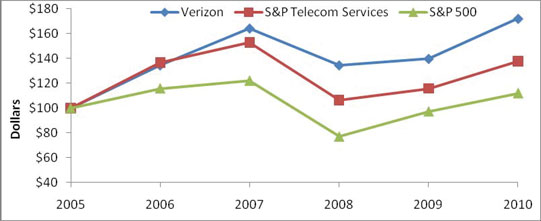
1. Introduction to Verizon Equity Audit
Verizon Communications Inc, one of the leading telecom companies in the world, has conducted a comprehensive equity audit, aimed at evaluating the company's diversity, equity, and inclusion (DEI) policies and initiatives. This audit was undertaken to assess Verizon's impact on fostering racial equity and its ongoing areas of focus.
The equity audit was conducted to evaluate Verizon's commitment to diversity, equity, and inclusion, as well as its potential to mitigate risks related to discrimination and inequality within the company. The audit aimed to assess the effectiveness of the company's diversity and inclusion policies, promotion practices, and related employee training materials.
Verizon's equity audit focused on specific areas, including the company's workplace DEI policies and initiatives, as well as its impact on fostering racial equity. The audit results will provide the company with an opportunity to improve on areas that need attention and recognize areas where they are performing commendably.
The racial equity audit is necessary in today's business climate, where the emphasis is placed on the importance of social justice and equitable treatment of individuals regardless of their race or background. The racial equity audit helps companies to identify where they have been doing well and identifies areas where they need to address issues of inequality.
The outcome of the equity audit will enable Verizon to mitigate risks related to racial inequality, discrimination, and biased decision-making within the company. Furthermore, it will position the company to compete effectively in an increasingly diverse marketplace, where businesses that prioritize equity, diversity, and inclusion practices receive better outcomes.
Verizon's equity audit is an excellent example of corporate social responsibility, and other companies should follow suit. Companies such as Amazon should commission equity audits to safeguard their employees' welfare and mitigate risks related to discrimination, inequality, and bias in their operations.
In conclusion, Verizon's equity audit is an impressive step towards promoting diversity, equity, and inclusion within the company. The results of the audit will provide many benefits, including mitigating risks, improving employee morale, and positioning the company for long-term success. Companies must prioritize these initiatives as part of their corporate social responsibility to make the world a better place.
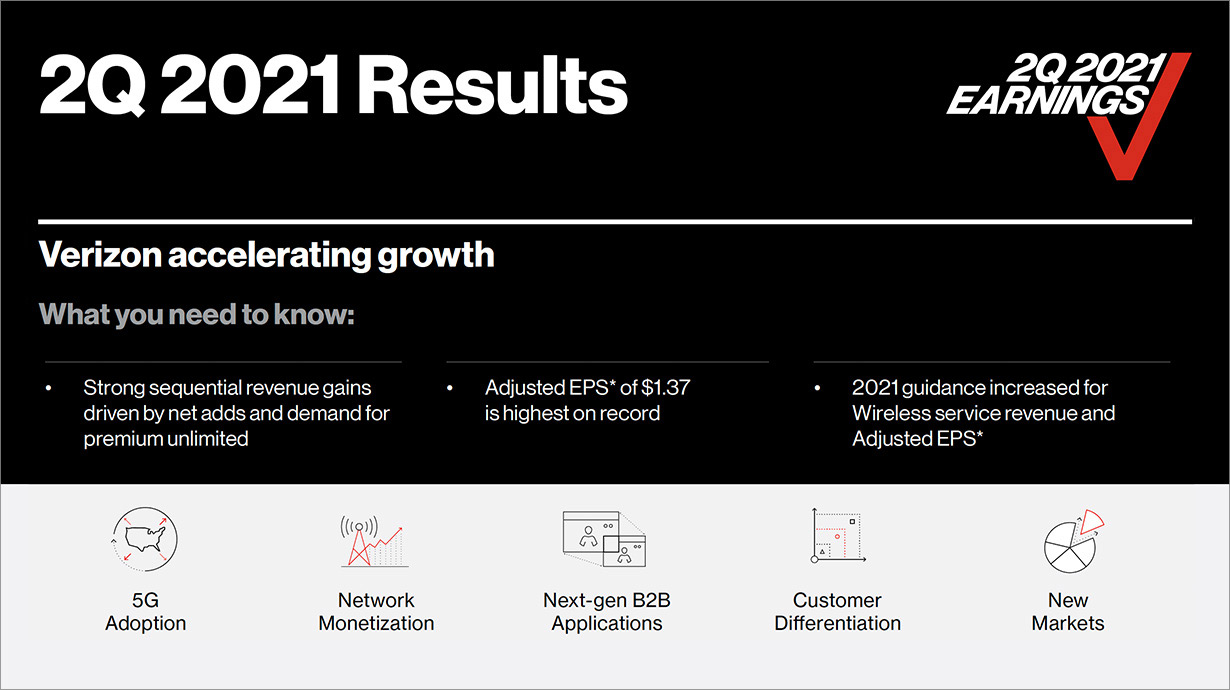
2. Focus Areas of Verizon's Equity Audit
Verizon recently conducted an equity audit to assess the company's ongoing focus on diversity, equity and inclusion (DEI) initiatives. As part of this audit, the company analyzed several focus areas, including workplace DEI policies and initiatives, in addition to evaluating the impact of these initiatives on fostering racial equity.
The audit's focus on workplace policies and initiatives highlights the critical role that such policies and practices play in promoting an inclusive work environment where everyone feels valued and heard. By ensuring that employees are treated fairly, Verizon is demonstrating its commitment to DEI principles across its organization.
Moreover, the audit's emphasis on fostering racial equity acknowledges the need for companies to address issues of systemic racism and discrimination. Fostering racial equity requires an ongoing commitment to creating a culture of inclusion, challenging unconscious biases, and providing equal opportunities to all employees.
The audit results have broader implications for other businesses, as it highlights the importance of conducting a racial equity audit to mitigate reputational, regulatory, legal, and license to operate risks. By commissioning a racial equity audit, companies can identify gaps in their diversity and inclusion policies and take meaningful steps to address them.
As companies increasingly recognize the importance of diversity, equity and inclusion in the workplace, the results of Verizon's equity audit set an important precedent. The findings have the potential to guide other companies in enhancing their DEI initiatives and creating a more inclusive and equitable work environment.
Moving forward, it is essential that companies not only conduct equity audits but also act on the findings to drive change in their organizations. By doing so, they can create a more inclusive and equitable workplace where everyone has equal opportunity to succeed.
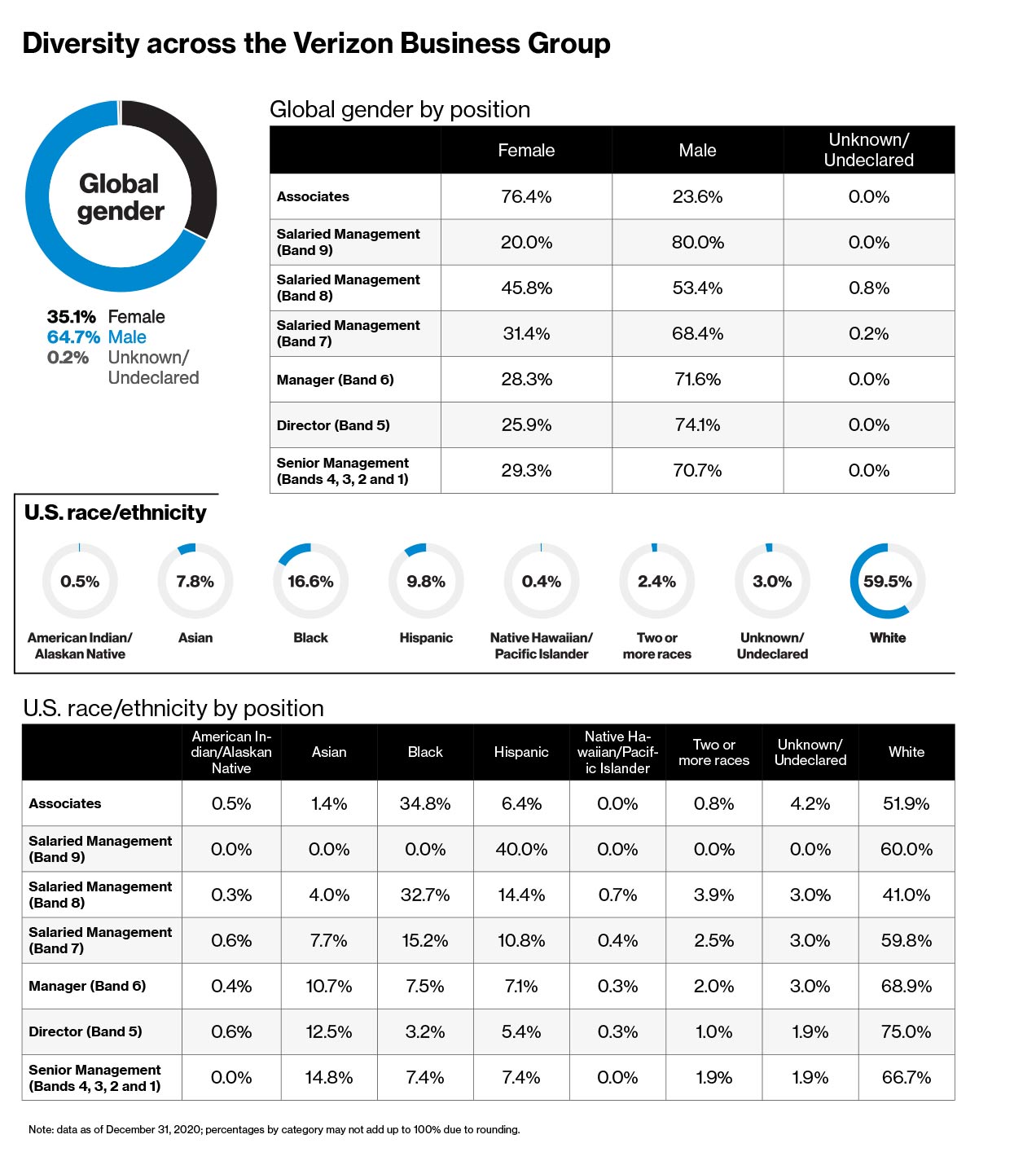
3. Workplace DEI Policies and Initiatives
Verizon's equity audit results reveal that the company has been making efforts to create a diverse and inclusive workplace. One of the areas that was assessed in the audit was Verizon's workplace DEI policies and initiatives.
According to the audit report, Verizon has implemented several policies and initiatives to promote workplace diversity, equity and inclusion. One such initiative is the company's employee resource groups (ERGs), which provide a platform for employees to connect and engage with colleagues who share similar backgrounds or interests.
Additionally, the audit found that Verizon has implemented training programs for employees to develop a better understanding of diversity, equity and inclusion issues. The company has also revised its recruitment and hiring policies to ensure a more diverse candidate pool.
In line with these efforts, Verizon has set a goal to increase the diversity of its workforce by 50% by 2025. The company's leadership team is also committed to improving diversity and inclusion within the organization.
The audit report highlights the importance of workplace DEI policies and initiatives in fostering a more inclusive workplace culture. These policies and initiatives not only benefit employees, but also contribute to the company's overall success by creating a more diverse and innovative workforce.
Verizon's equity audit results serve as a model for other businesses seeking to create more diverse and inclusive workplaces. As more companies recognize the benefits of workplace diversity and inclusion, it is important for them to implement policies and initiatives that foster a more equitable and inclusive environment for all employees.
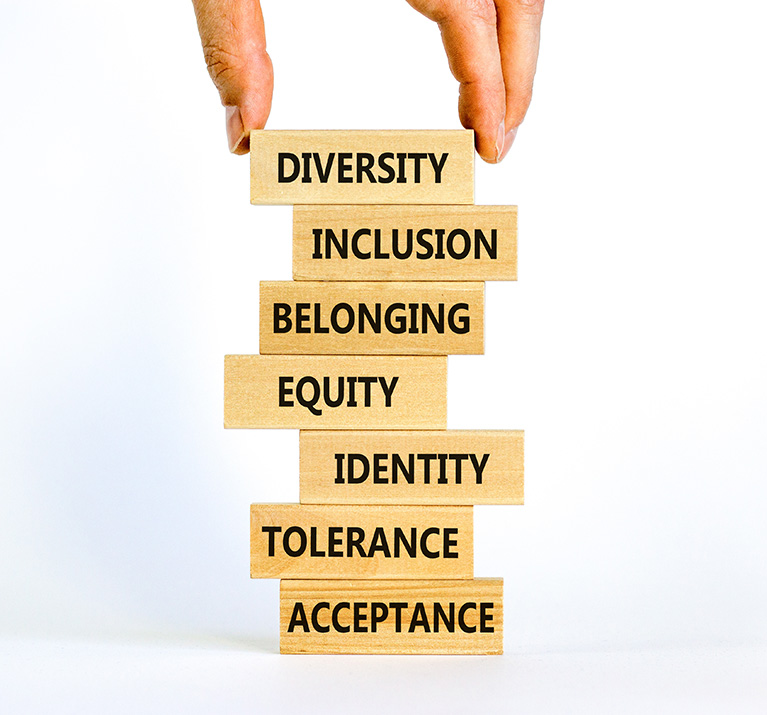
4. Impact of Verizon's DEI Focus on Fostering Racial Equity
Verizon Communications Inc. has been committed to promoting diversity, equity, and inclusion in its workforce, policies, and initiatives. As a part of this commitment, Verizon conducted an equity audit to assess its impact on fostering racial equity in the workplace.
The audit revealed that Verizon's focus on DEI has positively impacted the company's racial equity initiatives. The company has implemented several strategies to increase diversity in its workforce, including partnering with diverse recruitment agencies and providing equal opportunities to all candidates, regardless of race, national origin, or gender.
Verizon's employee resource groups have also been credited for their role in promoting diversity, equity, and inclusion in the workplace. These groups help to educate and engage employees on DEI issues and provide a supportive environment for diverse employees.
The company's commitment to fostering racial equity extends beyond its own workforce. Verizon has also promoted racial equity through its community engagement initiatives and partnerships with organizations that promote diversity and inclusion.
The audit's findings demonstrate the importance of a focus on DEI in promoting racial equity and the impact it can have on the workplace, the community, and society at large. It highlights the need for businesses to commission equity audits to assess their impact on diversity, equity, and inclusion and promote racial equity in the long run.
In conclusion, Verizon's equity audit has revealed the positive impact of its DEI focus on fostering racial equity. The company's commitment to promoting diversity, equity, and inclusion in its workforce and policies has translated into a positive impact on the community and society at large. Verizon's findings serve as a reminder for other businesses to prioritize equity audits to promote racial equity and mitigate risks associated with a lack of diversity and inclusion.

5. Reasons for Conducting a Racial Equity Audit in Businesses
Section 5: Reasons for Conducting a Racial Equity Audit in Businesses
In light of President Biden's recent focus on systemic racism and racial equity, companies like Verizon are conducting equity audits to examine their policies and procedures for promoting diversity, equity, and inclusion (DEI) in their workforce. But why should businesses invest time and resources in performing such audits?
Firstly, an equity audit can serve as a self-examination of a company's values and whether they are truly reflected in its policies and practices. This introspective process can help identify areas where a business needs to improve and create meaningful change towards DEI.
Secondly, conducting a racial equity audit can mitigate reputational, regulatory, legal, license to operate, and financial risks. Companies that fall short in their DEI efforts may face backlash from the public, legal trouble, and even loss of business.
Thirdly, an equity audit can help a company hold itself accountable and create a more inclusive workplace culture. By examining demographic data, conducting surveys, and listening to the experiences of employees, businesses can identify where their employees feel marginalized and take steps to address these issues.
Fourthly, companies can also gain a competitive edge by promoting DEI in their workforce. A diverse and inclusive workplace can improve employee satisfaction, attract and retain talent, and foster innovation.
Finally, conducting a racial equity audit can lead to a better understanding of the unique challenges faced by marginalized communities. Companies can use this knowledge to create more targeted initiatives to support these groups and make a positive impact on society as a whole.
Investing in a racial equity audit is not only the right thing to do, but it's also the smart thing to do for businesses looking to thrive in today's rapidly changing landscape. By promoting diversity, equity, and inclusion, companies can create a more just and equitable world while also benefiting financially and culturally.
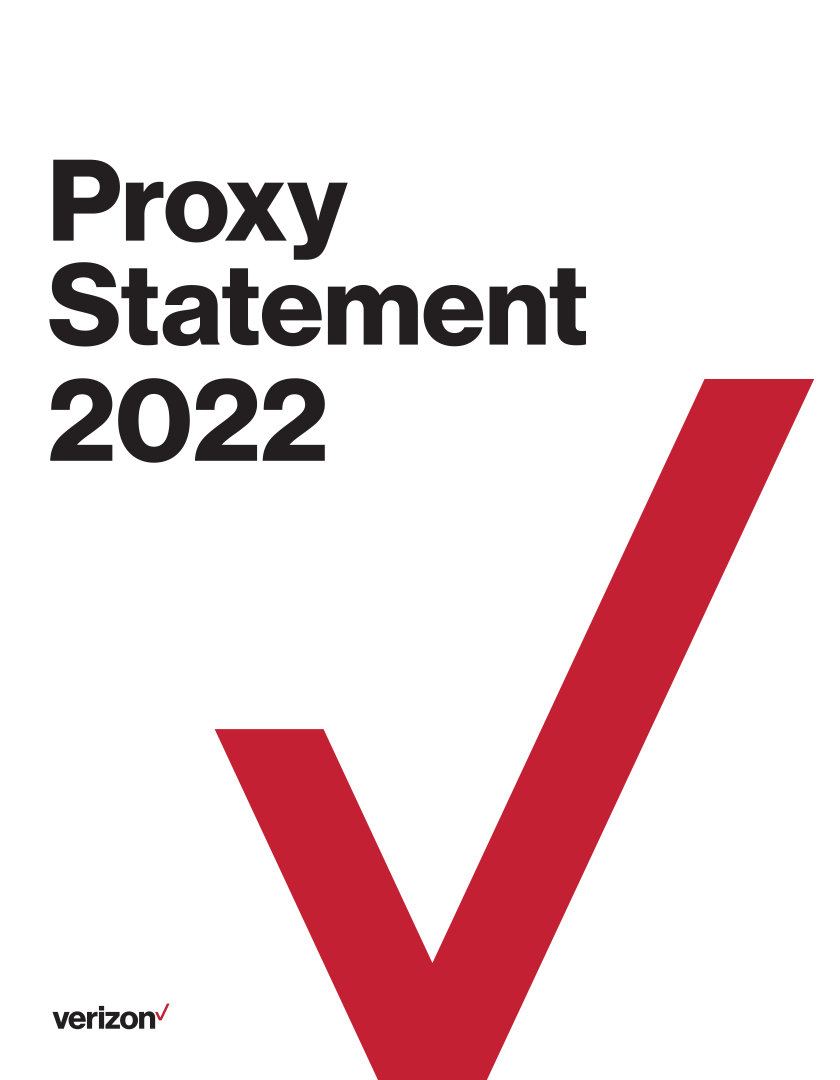
6. Importance of Racial Equity Audit to Mitigate Risks
Verizon's equity audit holds significant importance in mitigating risks associated with discriminatory practices, as highlighted in previous sections of the blog. A racial equity audit provides a thorough analysis of a company's policies and procedures, identifying areas that could potentially harm their reputation, regulatory compliance, legal implications, license to operate, and human capital management. By conducting such an audit, businesses can take proactive steps to minimize risks.
The audit results can reveal biases and stereotypical attitudes that exist within an organization, helping in the development of equitable policies that can lead to a more inclusive working environment. A racial equity audit empowers businesses to identify unconscious biases that may hinder progress in diversity, equity, and inclusion. The audit provides organizations with a mirror to look at oneself, encouraging introspection and analysis of actions taken towards promoting inclusion.
Poorly managed audits can have negative effects on businesses, causing reputational damage and inciting backlash. Therefore, it is crucial to select auditors with civil rights backgrounds that can produce the most useful and valuable results. In recent times, businesses have become more proactive in commissioning racial equity audits to align with their values and commitments made towards promoting DEI.
A racial equity audit can uplift not only organizations but entire industries. As more companies adopt and integrate equitable policies, it creates a ripple effect in their industries, leading to a paradigm shift. Furthermore, racial equity audits align with stakeholder expectations, attracting potential investors, customers and employees committed to promoting DEI in the workplace.
In conclusion, conducting a racial equity audit is essential in mitigating risks associated with discriminatory practices. An effective audit is a tool that can enable organizations to align with their values and commitments towards promoting DEI. By conducting an equity audit, businesses can create a more inclusive environment, driving progress and change across the industry.

7. Proposal for a Racial Equity Audit in Amazon
After the disclosure of Verizon's equity audit, many have started calling for similar efforts in other global corporations. One such corporation, Amazon, has decided to step up and conduct its own racial-equity audit led by former U.S. Attorney General Loretta Lynch.
The proposal to conduct a racial-equity audit in Amazon is based on the need to evaluate any disparate racial impacts on the company's nearly one million hourly employees resulting from its policies, procedures, and business practices. The focus of the audit will be on several aspects, including the oral content of diversity, inclusion, equity, or related employee-training materials.
The benefits of commissioning a racial-equity audit are enormous, and it is believed that the audit will help mitigate reputational, regulatory, legal, license to operate, and financial risks within Amazon. The results of the audit will also guide future actions that the company takes, based on the audit findings.
The proposal for a racial-equity audit in Amazon follows a similar effort by Verizon, which focused on the company's DEI policies and initiatives. The results of the equity audit conducted by Verizon reveal its positive impact on fostering racial equity in its workforce, and it is expected that Amazon's equity audit will also have a similar outcome.
The ongoing equity audit in Amazon is a positive step in the right direction, and it is a testament to the company's continued commitment to diversity, equity, and inclusion. It is hoped that other global corporations will follow in the footsteps of Amazon and Verizon and conduct their own equity audits to promote racial equity and fairness in their respective workplaces.

8. Benefits of Commissioning a Racial Equity Audit
Section 8: Benefits of Commissioning a Racial Equity Audit
Commissioning a racial equity audit can provide multiple benefits to a business. Some of these benefits include identifying areas where the business is falling short in terms of diversity, equity, and inclusion (DEI), understanding the impact of the business on civil rights and communities of color, and ensuring compliance with regulatory and legal requirements.
Verizon's decision to conduct a racial equity audit demonstrates the company's commitment to DEI and willingness to take a proactive approach to addressing any shortcomings. The audit will enable the company to identify areas where it can improve its workplace policies and initiatives, and ensure that its focus on DEI is fostering racial equity.
Moreover, recent proposals for racial equity audits at companies such as Amazon suggest that there is growing support for these audits among investors and other stakeholders. Commissioning a racial equity audit can be a powerful way for companies to demonstrate their commitment to social responsibility and stakeholder engagement.
Racial equity audits also have the potential to mitigate risks associated with reputation, regulation, legal compliance, and license to operate. By proactively assessing their impact on civil rights and communities of color, companies can identify and address issues before they become public relations crises, legal liabilities, or regulatory violations.
In summary, commissioning a racial equity audit can provide significant benefits for businesses looking to improve their DEI policies and initiatives, ensure compliance with regulations and legal requirements, demonstrate social responsibility, and mitigate risks. The results of Verizon's equity audit will likely provide valuable guidance for future actions, and may serve as a model for other companies seeking to improve their DEI practices.

9. The Results of Verizon's Equity Audit
9. The Results of Verizon's Equity Audit
Verizon recently underwent a racial equity audit, which assessed the company's workplace DEI policies and initiatives, as well as its impact on fostering racial equity. The audit was conducted independently and aimed to analyze if, and how, Verizon's policies and practices could be improved to promote diversity, equity, and inclusion.
The audit discovered that Verizon has made significant strides in its DEI initiatives, and many areas of focus were positively evaluated. Verizon's employee resource groups (ERGs), for instance, were deemed effective in promoting diversity and inclusion, with many employees praising the company's efforts to encourage them to participate. The audit also found that Verizon's recruitment processes showed potential for improvement, with more focus on inclusion and addressing any unconscious biases.
Despite the positive results, the audit report highlighted the need for Verizon to address several areas of concern, including the need to improve diversity within its workforce and strengthen its supplier diversity program. The report also recommended that Verizon invest in diverse recruitment pipelines to ensure a diverse and inclusive workforce, and to improve its DEI metrics to track progress and measure the effectiveness of its initiatives.
Verizon has committed to addressing these issues, and it is implementing changes to resolve the concerns raised in the audit. These include increasing the diversity of its workforce by expanding its recruiting efforts to a more diverse pool of candidates, implementing regular unconscious bias training, and providing more opportunities for diverse suppliers.
Overall, the results of Verizon's equity audit reveal a company committed to creating a more inclusive workplace and promoting racial equity. By addressing the issues raised in the report, Verizon will be better equipped to develop effective DEI initiatives and make a positive impact on society as a whole.

10. Conclusion and Future Actions Based on the Audit Findings
Verizon has recently conducted an equity audit to assess their ongoing areas of Diversity, Equity, and Inclusion (DEI) focus. The audit evaluated the workplace DEI policies and initiatives, as well as the company's impact on fostering racial equity. The results of the equity audit were highly anticipated by stakeholders, including shareholders and employees.
Based on the findings of the equity audit, Verizon has committed to taking several future actions to improve their diversity and inclusion efforts. One of the key areas of focus will be to develop a plan to increase diversity at all levels of the company, including leadership positions. Additionally, the company intends to provide unconscious bias training to all employees.
Verizon acknowledges that there is still work to be done to foster a culture of inclusion and equal opportunity. The company is committed to making continuous improvements by engaging with stakeholders, setting target goals, and regularly reviewing progress.
The equity audit serves as an example of the importance of businesses being proactive about addressing issues of racial equity and inclusion. It is a necessary step in mitigating risks and ensuring that all employees feel valued and supported in the workplace. By conducting a thorough equity audit, businesses can better understand their strengths and weaknesses, and develop strategies to address any gaps.
In conclusion, Verizon's equity audit has shown a commitment to DEI initiatives and sparked crucial conversations about the importance of racial equity in the workplace. The company's future actions will ensure that the progress made during the audit is sustained and continued. Verizon hopes that other businesses will follow suit in conducting equity audits and making meaningful improvements to foster a more inclusive and equitable workplace.

